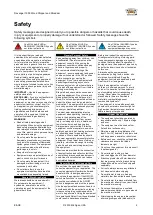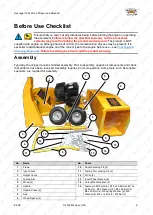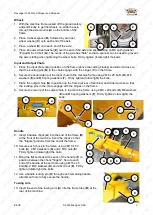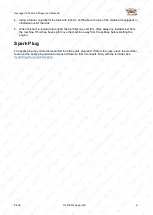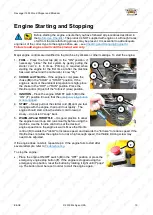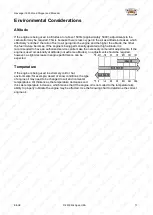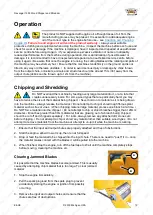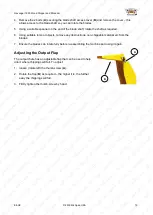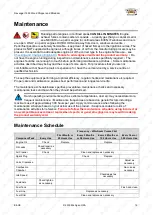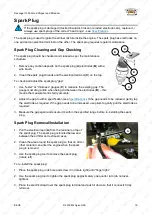
Ravenger 1950 Wood Chipper and Shredder
E&OE
© 2019 Michigan USA
3
stop moving before moving, lifting etc.
General Fuel Safety
Petrol/fuel/gasoline is extremely
flammable – keep clear of
naked flames or other ignition
sources.
•
Do not spill fuel. If you spill fuel, wipe it
from equipment immediately – if fuel
gets on your clothing, change them
immediately
•
Do not smoke near fuel.
•
Always shut off the engine before
refuelling.
•
Do not refuel a hot engine.
•
Open the fuel cap carefully to allow any
pressure build-up in the tank to release
slowly.
•
Always refuel in well ventilated areas.
•
Always check for fuel leakage. If fuel
leakage is found, do not start or run the
engine until all leaks are fixed.
General Electrical Safety
•
Inspect electrical equipment, extension
cords, power bars, and electrical fittings
for damage or wear before each use.
Repair or replace damaged equipment
immediately.
•
Ensure all power sources conform to
equipment voltage requirements and are
disconnected before connecting or
disconnecting equipment.
•
When wiring electrically powered
equipment, follow all electrical and
safety codes.
•
Wherever possible, use a residual
current device (RCD).
•
Electrically grounded equipment must
have an approved cord and plug and be
connected to a grounded outlet.
•
Do not bypass the on/off switch and
operate equipment by connecting and
disconnecting the power cord.
•
Do not use equipment that has exposed
wiring, damaged switches, covers or
guards.
•
Do not use electrical equipment in wet
conditions or damp locations.
•
Do not use electrical cords to lift, move
or carry equipment.
•
Do not tie electrical cords in tight knots
and ensure electrical cords do not
present trip hazards.
General Service Information
•
Have the equipment serviced or repaired
at authorized service centers by
qualified personnel only.
•
Replacement parts must be original
equipment manufacturer (OEM) to help
ensure that equipment safety is
maintained.
•
Do not attempt any maintenance or
repair work not described in this
instruction manual.
•
After use, the equipment and
components may still be hot – allow the
equipment to cool and disconnect spark
plugs and/or electrical power sources
and/or batteries from it before making
adjustments, changing accessories or
performing repair or maintenance.
•
Do not make adjustments while the
equipment is running.
•
Perform all service related activities
under suitable conditions, such as a
workshop etc.
•
Replace worn, damaged or missing
warning/safety labels immediately.
•
Do not clean equipment with solvents,
flammable liquids or harsh abrasives.
DANGER
Running petrol engines in confined areas
CAN
KILL IN MINUTES
. Engine exhaust fumes
contain carbon-monoxide – a deadly gas that you
cannot smell or see.
NEVER run a petrol engine in confined areas
EVEN IF windows and doors are open. ONLY run
petrol engines OUTDOORS and away from
doors, windows and vents.
Do not operate the equipment in hazardous locations,
such as where there may be a risk of fire or explosions
from flammable liquids, gases or dust.
Do not operate the equipment in confined areas where
exhaust gases, smoke or fumes could reach dangerous
concentrations.
Do not refuel petrol engines while they are running.
Never smoke while refuelling petrol engines.
For generators, the electrical output is potentially lethal
and must only be connected to a fixed electrical
installation by an appropriately licensed person.
Be aware that the equipment may include hazardous
components, such as blades, hot surfaces and moving
parts.


